Chapter 2
My Mother
Early in the morning of January 22, 1968, Lucy and I arrived at St. Joseph’s Hospital in
Georgetown to visit my mother who had been seriously ill with a build up of fluid around her
lungs. As soon as I entered the room, I sensed that something was seriously wrong. Ma was
hysterical, and the private nurse complained that it had been a difficult night. Ma had
hemorrhaged for over eight hours. Her hands and feet were very cold and painful. She
pleaded with us to lift her out of the bed to stimulate circulation. Lucy and I massaged her
hands and feet with little effect. I felt helpless and upset; we could not ease her pain.
That period had been hectic and difficult. I was busy preparing to hand over
responsibilities to my replacement at Correia’s Enterprises Ltd. Lucy and I were scheduled to
leave Guyana permanently for Canada in February. Two representatives from Ful-O-Pep
Feeds in USA were in Guyana and I had to take them to visit a few large poultry farms. An
important meeting had been scheduled the following day on the lawn of Booker’s Sports Club.
The representatives were to address poultry producers. That morning I found it difficult to
concentrate. At noon I got word that Ma needed a blood transfusion. I reported to Mike
Correia, my boss, and took the afternoon off. I rushed to the hospital and donated blood.
Later that afternoon I received a phone call that Ma had passed away. Aunty Taicee
was at her side. I was totally devastated. A feeling of emptiness surrounded me. Ma was only
64 years. Now both of my parents were gone, my father six years earlier, and he was only 60.
The autopsy showed that her stomach lining was somewhat eroded, most likely due to
excessive medication. I was told later that she had been using tranquilizers to relieve stress.
Only a few weeks earlier she had been at our Christmas Eve party which had become a
tradition. After the Drug Store was closed at midnight, the staff always had a party upstairs.
Even former employees returned to help in the store and to celebrate. Ma had been tired and
even though her eyes were closing, she refused to leave. She had a warm feeling for the
employees and felt obligated to remain.
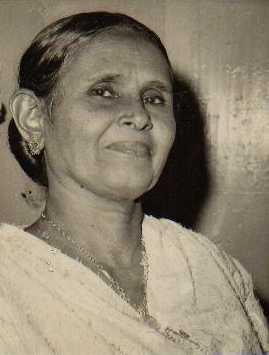
| My Mother (Ma) |
My earliest recollection of my mother was when I was about three or four years old when
she carried me in her arms. On a few occasions I cried when I was bored as she chatted with
friends. Her two best friends were Mrs. Ramsammy and Julie Rachpaul. They gave a helping
hand in times of need. The Ramsammy boys--Daniel, Walter, Cyril and Joseph, gave me
haircuts for free and never complained. They had a lot of respect for Ma. Two other friends,
Mrs. Moriah and Mrs. Carter, lived in the next village, Golden Grove.
We lived at Bush Lot, 56 miles east of Georgetown, the capital of Guyana. Daddy
worked in Georgetown, managing Regent Pharmacy for my uncle, Dr. J. P. Lachmansingh. He
came home one weekend each month. My mother ran the household by herself. She sold
farm produce to supplement the small family income and was able to survive because of hard
work. When I was about seven or eight years old, I accompanied her regularly very early in the
morning, to the sea shore, a mile away. We collected wood for fuel. With a padding over her
rummal, she was able to carry a heavy load on her head. Ma was physically strong for her
small stature, 5’ 3” and 105 lbs. She had grit and determination. We also went regularly to our
farm, two miles away, to collect produce--plantain, cassava, mangoes, and other fruits. Once
we returned home and it was still dark. That meant that we had left home at about 3 a.m.--a
very scary thought. We did not have a clock.
In October 1944, we had our school vacation for rice harvesting. I spent the whole time
at Abary with Aunty Bayba, my father’s sister. I was kept busy helping with the chickens and
enjoyed collecting eggs. When I returned home I was so overwhelmed with emotion that when
my mother hugged me, I burst into tears.
On one occasion I was very scared when our neighbour Bisoondai, walked up the steps
of our home and threatened to attack Ma. Bisoondai had a very loud and intimidating voice and
had a bad reputation in our neighbourhood. I wished that my father or older brothers were
there to defend her.
When I was quite young, Ma had to be hospitalized. She and Boughie Julie went to the
farm at Golden Grove to pick mangoes. When they were crossing a small ditch, an alligator
attacked and held on to Ma’s foot. She screamed in pain, and Boughie Julie ran and shouted
for help. Fortunately, Ma had a cutlass in her hand and tried to defend herself. The ordeal
seemed to last forever. Eventually, the alligator released her and disappeared into the bushes.
Some villagers in the neighbouring plots heard the screams and rushed to her aid. By then Ma
had fainted and had to be carried to the village for medical assistance. She was hospitalized
for a few weeks in Georgetown. The marks from the large gash remained on her leg for the
rest of her life. It would appear that that traumatic experience affected her throughout her life.
Whenever she received a blow in that area of her leg, she fainted.
She was always busy--looking after the home, the farm as well as our kitchen garden.
There were dry coconuts to be dehulled, grated and oil had to be extracted. Clothes were
washed by hand in a tub with a scrubbing board. Ironing was done with hot irons heated on a
coal pot. She sewed shirts for me from a pattern taken from an old shirt. As children, Enid,
Reuben and I had several chores--washing the kitchen floor and steps once per month, and
carrying buckets of water from the tap in our yard to the water barrel in the kitchen. We also
had to water the plants in the garden, take care of the chickens, and tidy the yard. We
collected ‘boosie’ and ‘payah’, scraps from the two rice mills in the village, to feed the chickens.
Ma stayed up with me as I studied to take the Government County Examination in 1948.
We used a kerosene lamp as there was no electricity in Bush Lot and I was too scared to be
alone. Both she and Daddy knew the importance of a good education and earlier had sent
Ralph and Clement to stay with Uncle Ramjeet at Massiah to attend Tagore Memorial High
School. By then, Hilda was married and Lionel was managing Croal’s Drug Store for my uncle
in Georgetown.
Ma, Ellen Bhagmat, known as Baby, Aunty Baby or Baby Aunty later, was born at Novar
on the East Coast of Demerara on September 6, 1903. She was the third child of Sewsankar
and Ramdei. George Ramdial, Papa Ram/Big Mamoo, and Edward Balkaran, Lil’ Mamoo,
preceded her. Madeline Phulmat, Aunty Taicee was her younger sister. I cannot recall Ma
telling me about any time spent at Novar. I also know very little about her early days at De
Hoop. All I know is that her father was an alcoholic and that Mai, my grandmother, had had a
difficult time taking care of her four children. I do not know how much schooling Ma received
but most likely very little--about four or five years. She knew some Hindi which she learnt from
her grandfather, an immigrant from India. Her marriage to my father in 1920, when she was
seventeen years old, was one which was prearranged by the Canadian Presbyterian
missionaries. Both sides of the family, Hindus originally, had adopted Christianity and the
Presbyterian Church played an important part in their lives.
Living with her in-laws was one of the hardships which she endured in those early years.
Daddy had no regular job but worked with his father in rice farming. The communal family
home was typical of that time. Whenever Ma was expecting a child, she returned to De Hoop to
be with her mother. All my brothers and sisters except Esmond were born at De Hoop.
Esmond and I were born at Bush Lot. All births were home deliveries.
Perhaps the saddest moment in her life was the accidental poisoning of Harold, her
second child, then only 1 1/2 years old. She was always reluctant to discuss it. After constant
prodding, I was able to get “bits and pieces” of the incident. She had returned to De Hoop to
get help with the children. Harold had been ill with a cold and fever and had received
medication from the doctor. It was late one afternoon and the kerosene lamp had not been lit.
Harold was crying. He did not like his medicine and she had always had to force him to take it.
On that occasion she mistakenly got the wrong bottle which was in the same location as the
medicine. Harold died soon afterwards. The tragedy was overwhelming to the family. She was
charged by the police but fortunately was acquitted by the court.
Ma spent 28 years (1920-1948) at Bush Lot. When I was twelve we moved to Robb and
Cummings Streets in Georgetown. Our home was owned by my uncle and we paid no rent. It
would have been impossible for us to pay a rent because my father only earned twelve dollars
per week. By then, Ralph was working at the Public Hospital in Georgetown; Hilda and family
were living at Albion. Clement, Reuben and I were attending Central High School while
Esmond was still at Primary School. Enid was taking Short-Hand and Typing lessons. Lionel
and his young family occupied one room. The house was crowded and it was tough on the
whole family. After two years we moved to Broad Street, a smaller house, but by then Lionel
had moved to his own home.
When we moved to Georgetown, Ma wanted to attend Burn’s Presbyterian Church. I
accompanied her to Church the first time. She had received directions but somehow we ended
up in the wrong church on the same street. As soon as we entered the Church, Ma whispered
that we had made a mistake. But she was too embarrassed to leave and we remained for the
whole service. She remained an active Presbyterian throughout her life. I had also
accompanied her to Church at Bush Lot where I heard the congregation singing bhajans, Hindi
translation of hymns.
When each of her grandchildren was born, she was there to give a helping hand. My
nephews Vibert, Norman and Clifton spent many week-ends with us. Vinco, Leni, Neil, Lorna,
Rowena and Rudy spent most of their holidays with us. Later, Leni, Neil and Rudy lived with us
when they attended High School and worked in Georgetown. I was touched when I heard Leni
telling me a few years ago, that he developed his good work habits because of Ma’s influence.
He expressed gratitude to her for helping him to save his money to pursue his studies abroad.
When Daddy died in 1961 her life changed. She realised that Esmond was too young to
manage the store. After working all morning in the kitchen, she managed the store in the
afternoon to give Esmond a rest. This meant that she had to learn quickly. She also started to
read books in the little spare time that she had. We secretly made fun of her when she started
to read love stories. We noticed a change in her as her horizon was broadened by the new
experience. There were certain customers who only wanted her to attend to them because she
showed an interest in their well being. The staff in the store had a lot of respect for her and
called her Ma. About a week after her death in January 1968, I was in the store when an old
lady came and asked for her. Apparently she had not heard the sad news and when she was
told, tears started to stream down her cheeks. I was moved and was in tears.
She was caring and loved her children and grandchildren. She was proud of them and
made a lot of sacrifices to help. Perhaps she developed this quality from Mai, my grandmother
who also showed love and affection to her children and grandchildren.
She was very hard working. There were a few occasions when she was under a lot of
stress and felt totally frustrated. On those occasions when she felt that there was no
appreciation or understanding from Daddy, she vented her emotions by pouring a bucket of
water on the kitchen floor. She was able to take time to relax in her later years. By then she
had slowed down considerably.
She was very kind. She gave food and money to the poor and needy. She gave
accommodation to strangers who were stranded at Bush Lot. She had a soft spot for Mr.
Bowman who had a weakness for alcohol. Mr. Bowman was an excellent cabinet maker and a
skilled craftsman. Whenever there was a difficult job to be done, Mr. Bowman was there to give
advice or lend a helping hand. He took advance payments for jobs but never was able to
complete them when the money ran out. He lived alone in very poor quarters not far from our
store. He was often hungry and Ma was there to offer him something to eat. She also gave
him clothes and he was always grateful. He became part of the family. Relatives from the
country often stayed with us when they had exams to write or any other engagement which
required their presence in Georgetown.
She always remembered her friends from Bush Lot and occasionally made a trip to see
them.
It is hard to believe that Ma and Daddy never took a holiday together. Ma never visited
Corentyne or Essequibo. In her later years she went to Abary and she told me that she was a
good swimmer in her early years. Her first trip abroad, in an airplane, was visiting Clement,
Selina and family in England in 1966. She seemed to have really enjoyed that trip because she
was always talking about it.
After many years, my brothers, sisters and other immediate relatives still grieve the loss
of our parents. They have been a great influence and inspiration to us. We will always cherish
those memories.
|
|
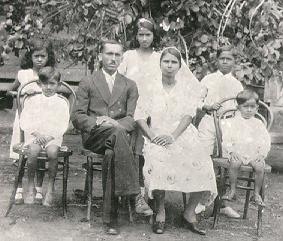
|
An Early Family Picture
Seated(L to R) Reuben, Daddy, Ma, Hector
Standing(L to R) Enid, Hilda, Clement |
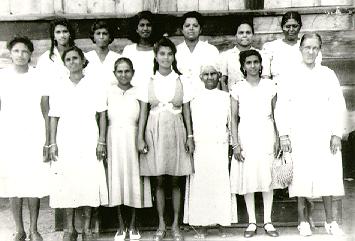
|
Bush Lot Church Group |
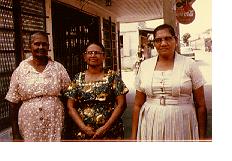
|
Aunty Ticee, Ma and friend Dania Persaud
|
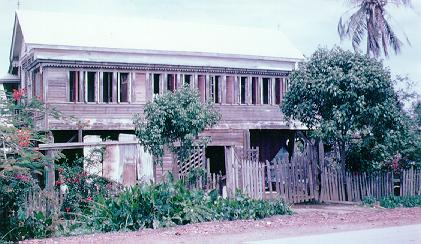
|
The house where I was born -it has since been torn down
|
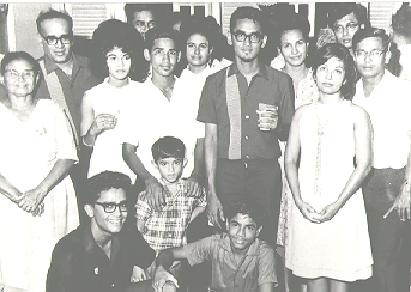
|
My nephew Neil's 21st birthday. Ma is on the left. Neil is in the center with glass in hand.
|
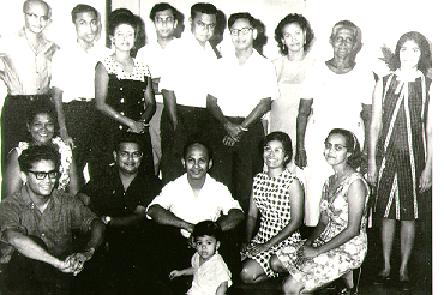
|
Family Gathering after Ma's funeral: Standing (L to R)
Lionel, Reuben, Enid, Esmond, Ralph, Hector, Hilda, Aunty Taicee, Preya.
Sitting (L to R) Leni, Sheila, Sydney, Clement, Frank, Lucy, Baba. |
ToC
Chapter 1
Chapter 3






